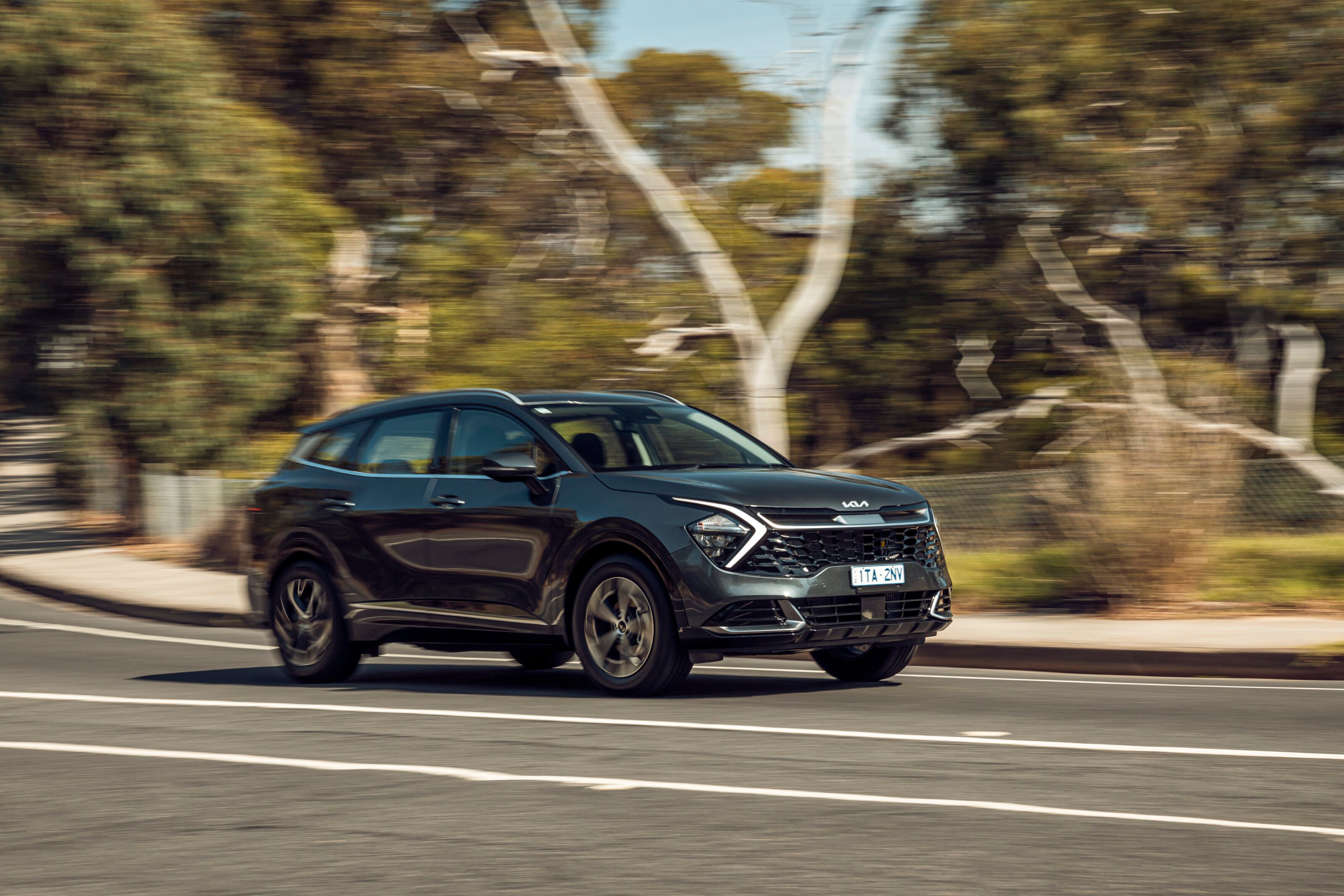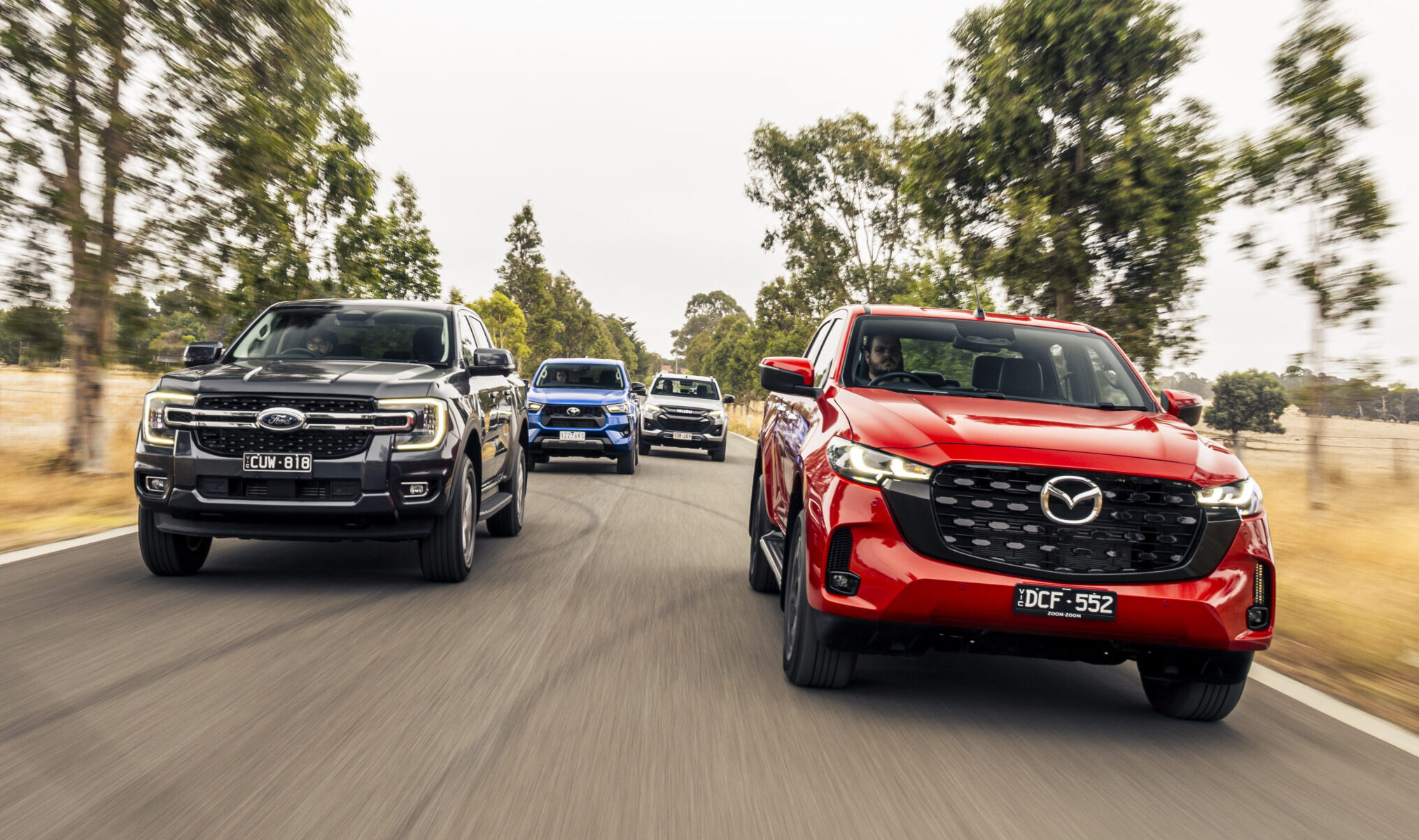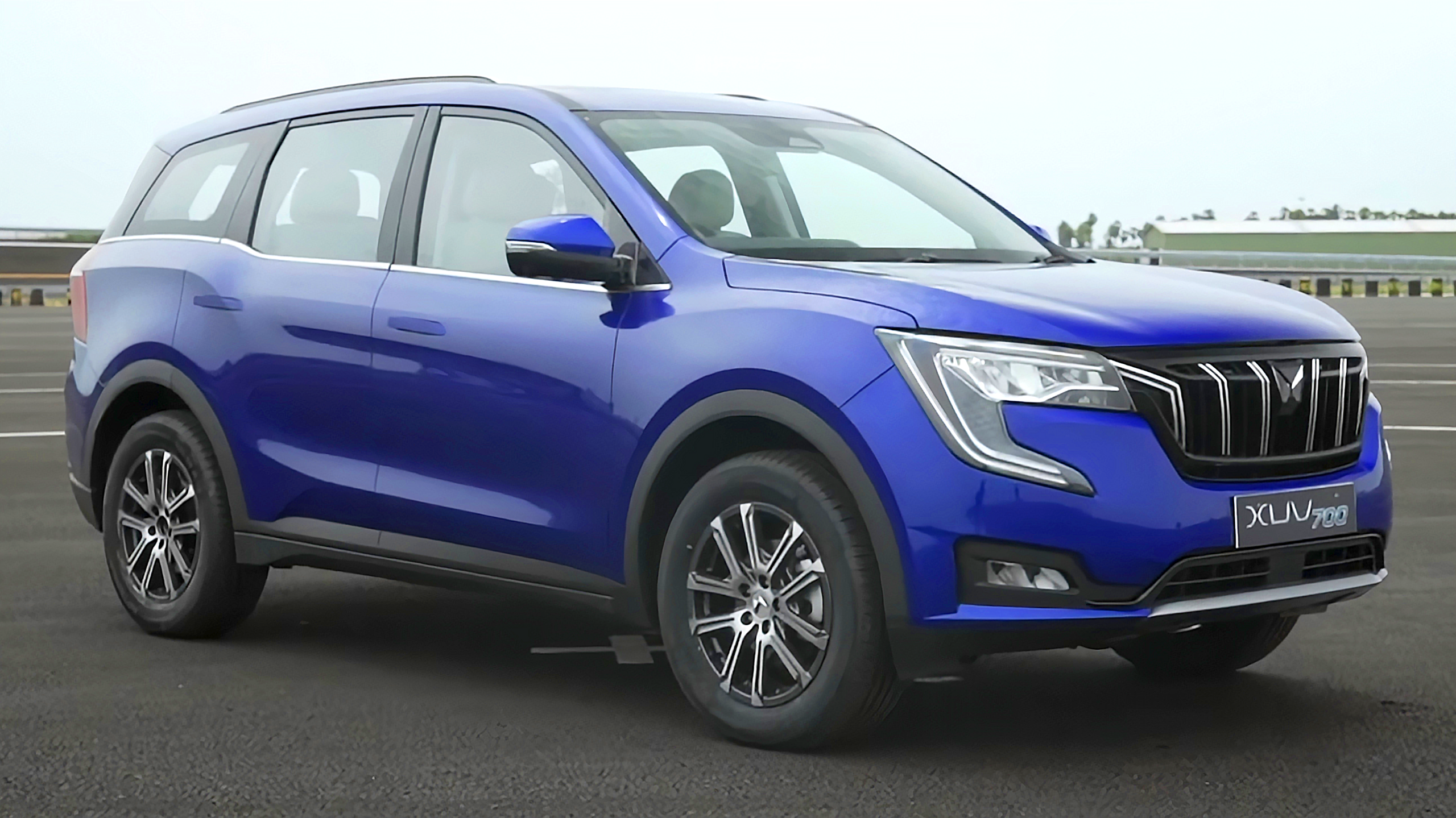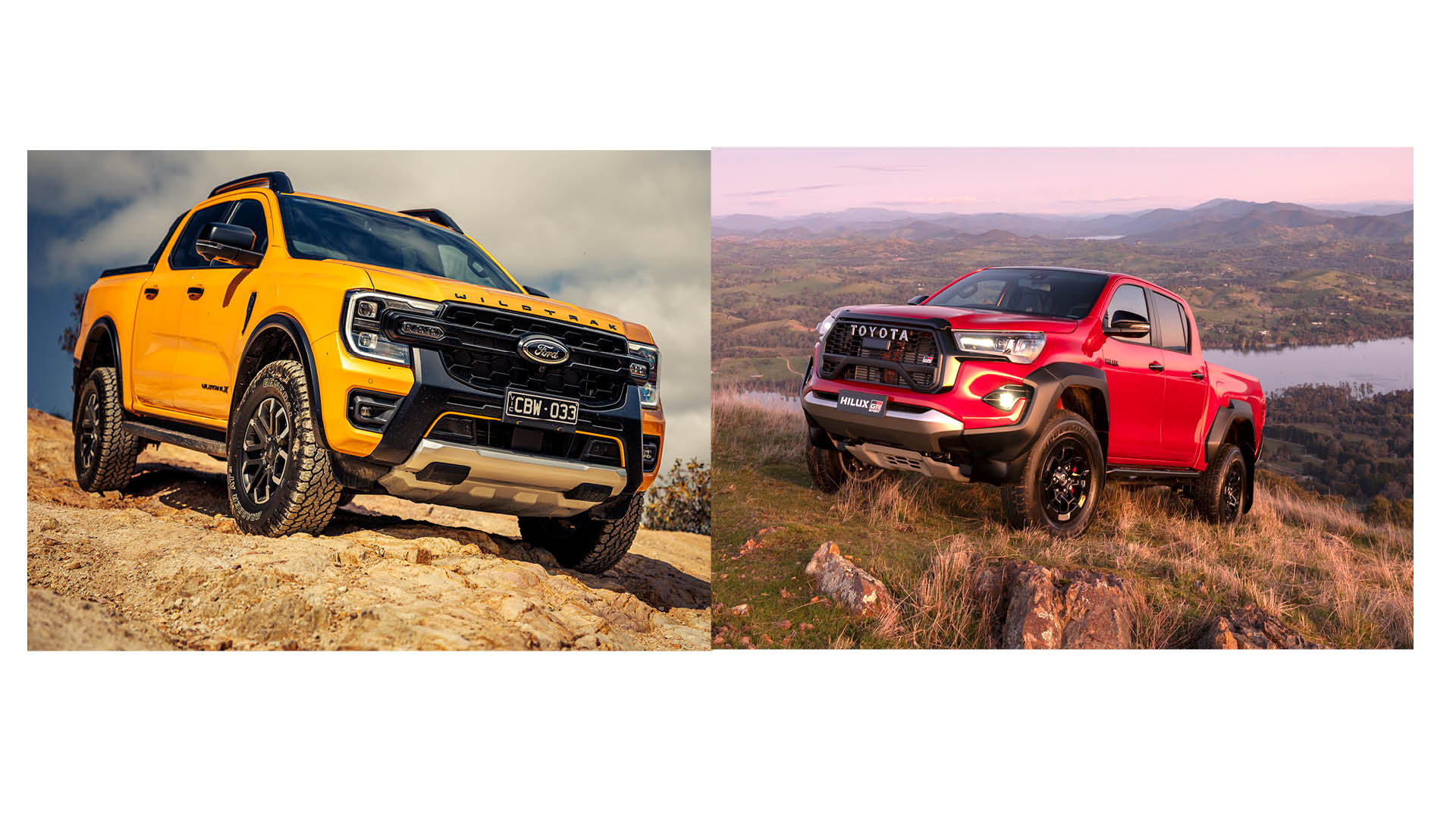Score breakdown
Things we like
- Looks and drives great
- Excellent use of digital screens
- Spacious and comfortable
- Efficient diesel engine
Not so much
- SX equipment and interior trim a letdown
- Fussy lane-keep assist
- No wireless smartphone mirroring
- No window tints
While the previous model was doing nothing to excite anyone or differentiate itself from the rest of the mid-sized SUV pack, the design of this 2022 Kia Sportage is so bold as to be quite literally turning heads – though not in that ‘what a funky car but I’d never actually buy one’ kind of way.
The line-up consists of four grades, from the entry S to the mid-range SX and SX+ and finishing up with the top-spec GT-Line.
Here we have the SX, powered by a 2.0-litre turbo-diesel with eight-speed torque converter automatic transmission and all-wheel drive. Other engines are available, though this is undoubtedly the best one – more on that later.

All trims benefit from the striking boomerang daytime running lights and tiger-nose grille, and it wears the new Kia logo that was introduced last year.
But while the exterior styling of the mid-spec SX variant is pretty lush, its interior lacks some of the bells and whistles that give the flagship GT-Line its premium feel. So does the SX still represent good value? Or should you stretch to more expensive models higher in the range? Let’s find out.
Pricing and Features

The 2022 Kia Sportage range starts at $36,820 drive-away (based on Melbourne registration) for the lowest-spec S on offer, but the SX we have with the 2.0-litre turbo-diesel and the eight-speed auto comes in at $47,193 drive-away – plus add an extra $520 on top for premium paint, which in this case is Gravity Grey.
You can buy the SX for less than $40K if you prioritise price over driving performance. Opting for the 2.0-litre petrol engine with a six-speed manual drops the sticker price down to $39,483 drive-away.
Meanwhile, the top-spec GT-Line will set you back between $54,457 and $57,583 drive-away depending on the powertrain chosen.
There has been a significant price bump from the last model when it arrived in 2018. But does it matter? Increasingly, with supply issues, shipping issues and, COVID-19 issues – it would seem not.

Taking the Sportage on a day out to Mother’s Beach in Mornington, we returned after a cheeky ice-cream pit-stop to find a couple in their 50s giving the Kia the eye as if it were from a luxury brand.
“Wow,” the hubby proclaimed. “That’s a good-looking thing isn’t it!”
It turned out the couple’s daughter had recently tried to buy a Sportage but wasn’t prepared to wait the expected six months it would take to get her hands on it. She bought the new Peugeot 3008 instead, which at $58,695 drive-away in GT 2.0-litre diesel guise, is more than $11.5K over the price of the Kia. The point being, they splashed the cash anyway just to get into a car ASAP.

Best-sellers in the segment such as the Mazda CX-5 and Toyota RAV4 are also pricier than the Kia, commanding around $3000 and $1000 more respectively for the roughly equivalent CX-5 Touring Active and RAV4 GXL.
The new Mitsubishi Outlander, however, is around $2000 less expensive if you go for the equivalent mid-spec LS all-wheel drive.
There are some slight spec and equipment differences to note, of course, and the Toyota and Mistubishi don’t offer a diesel engine. The Toyota comes with a frugal 2.5-litre petrol hybrid drivetrain and the Mitsi a 2.5-litre naturally aspirated petrol.
As standard, the SX gets Kia’s new 12.3-inch infotainment screen paired with a 12.3-inch digital instrument panel, auto up/down window controls in the front, six-speaker sound system, and sat-nav that works well – even if it looks a little cluttered with the split-screen in use and is unnecessarily fiddly to use on-the-go.
Opting for the more focused single view layout is much better and far less distracting, making use of that vast screen space and minimalist map layout, but Apple CarPlay/Android Auto-supported apps are still the better option.

The infotainment can be accessed through a touch panel rather than physical buttons, which can be toggled between the menu options and climate control. It works well and you don’t find yourself missing the hard buttons at all.
SX trim also nabs a full-size spare wheel, 18-inch alloys, LED headlights and tail-lights, silver roof rails, body-coloured mirror housings, and gloss black bumpers and wheel arches – which oddly, we feel, give it a cleaner, more premium aesthetic than the matte black plastic alternative found on the higher grades.
What it loses, being two steps down from the range-topping GT-Line, isn’t a deal-breaker but does take away from some of its charm. In place of a rotary dial gear shifter is a traditional stick and it foregoes the panoramic sunroof (though in fairness there are big windows all round that give a light and open feel), easy-open doors, wireless device charging, front fog lights, paddleshifters, a powered tailgate and a smart key.
Oddly, wireless Apple CarPlay/Android Auto is only available on the entry-level S that has a smaller 8.0-inch touchscreen.
The infotainment can be accessed through a touch panel, which can be toggled between the menu options and climate control. It works well and you don’t find yourself missing the hard buttons at all

We can’t tell you how frustrating it is to be missing a powered tailgate and keyless start on a car of this price and general overall standard – and how glaringly obvious it is when the absent buttons are filled in with blank plastic just to make sure you realise what you don’t have.
Actually we can tell you – having to physically insert a key these days and not just chuck it into a cup holder or not have to bother getting it out of your bag or pocket at all, plus manually pulling down quite a heavy tailgate, is pretty tedious. Sure it’s not really a big deal, first world problems and all, but they’re the touches modern car buyers expect.
As a result of losing the smart key, the SX also drops the remote parking assist function found on the GT-Line, which is a cool selling point of the new generation Sportage. The tailgate button on the key only serves to unlock the boot separately from the doors.

As far as safety equipment goes, the SX gets almost the full suite available in the Sportage range, including systems such as ABS, stability control, hill-start assist, lane-keep assist, blind-spot collision warning and avoidance, autonomous emergency braking (AEB), front and rear parking sensors, a rear-view camera (with an impressively crisp picture), three top-tether anchors and two ISOFIX points – easily found and accessible, making installing a car seat a cinch in seconds.
Trailer stability assist, high beam assist and blind-spot collision avoidance however are only available in the auto SX, not the manual.
Having recently driven the GT-Line, we missed the blind-spot view monitor in the SX, as it’s a nifty feature when cornering

In fact, the only safety equipment left off the SX’s extensive safety list and held back for the top of the range GT-Line is the self-dimming rearview mirror (can be had in SX+), surround-view monitor with 3D mode, blind-spot view monitor and reverse parking collision avoidance assist. Having recently driven the GT-Line, we missed the blind-spot view monitor in the SX, as it’s a nifty feature that shows the view down the sides of the vehicle when indicating.
Some of the alarms for the safety alerts were a little grating at first, but fortunately you can adjust the volume up or down, or even on or off for many of them, including the rear occupant alert and seatbelt warning, to suit you.
Like us, you may well find it comes to that when the annoyingly loud bongs of the rear parking sensors were so penetrating that any chance of relaxing to the ‘sounds of nature’ feature found in the media system was nigh-on impossible. Turning them down to a lower, though still perfectly audible, level was much better.
Comfort and Space
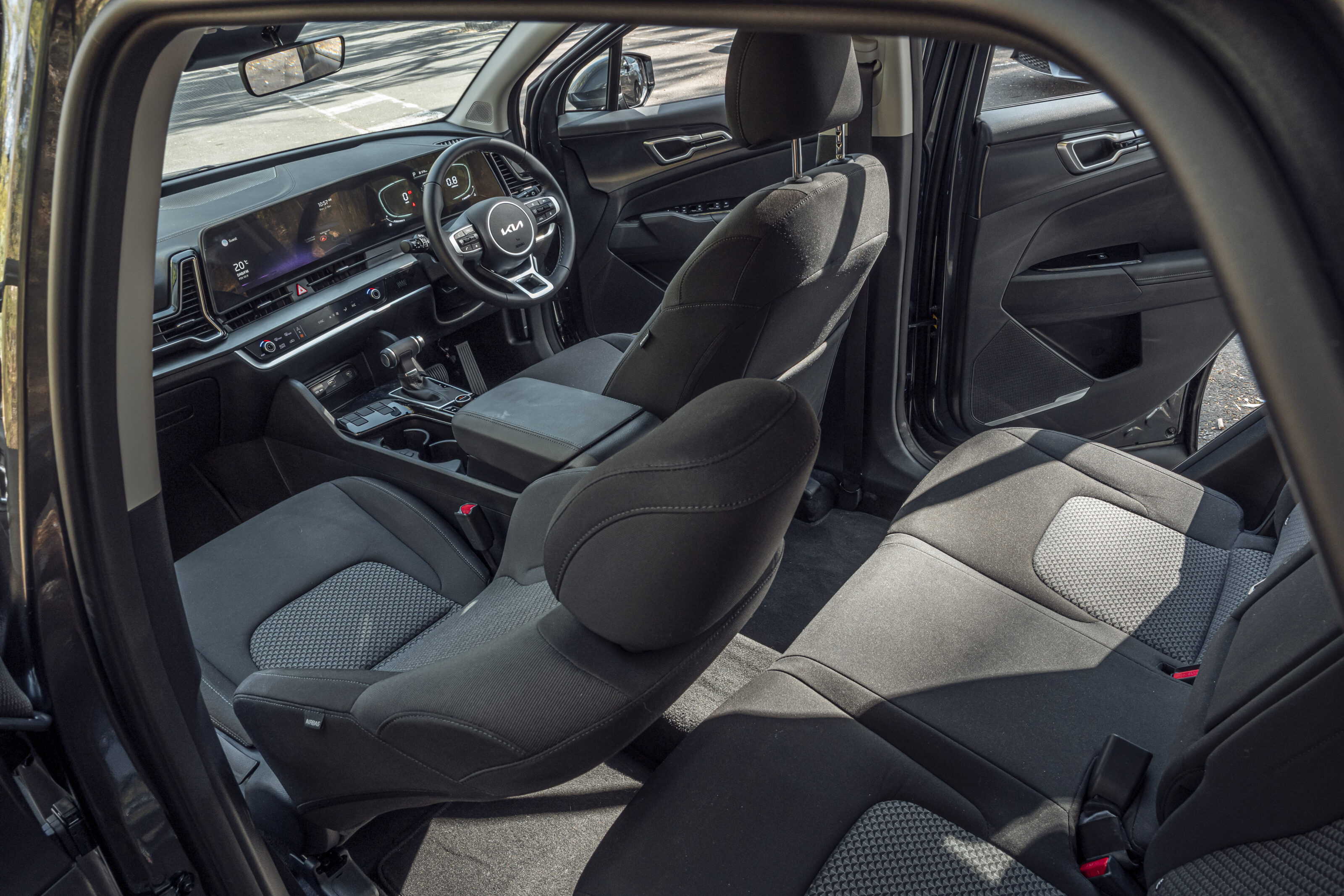
While the SX gains Kia’s standout 12.3-inch infotainment/digital display there’s little else inside to set it apart from the entry-level S variant.
There’s a lot of hard plastic to be found, especially on the doors and centre console, which undermines the sense of quality a little.
Brushed metal dash garnish and grain effect for the door handle surrounds help elevate things, as does the leather-appointed gear selector – though it’s a real shame the SX loses out on the rotary dial available in the GT-Line grade as it’s surprisingly easy to use and looks great.

The doors and central armrest benefit from soft-touch faux leather, but the seat fabric is a real letdown, with the black cloth trim (complete with exposed zips on the front seatbacks) proving scratchier than a canvas bag.
Our test variant also lacks the heated and ventilated seats on offer higher up in the model range, as well as replacing eight-way electrically adjustable ones with a manual option.
A day out with a packed car of four adults and a child in a car seat is handled easily with room to breathe … no squashed sardines here!

A saving grace here is that it does come with two-way lumbar support over the base S, and even though it is manually operated, it does help with seat comfort, which is more than adequate for a long journey.
Like the rest of the Sportage range, the SX boasts impressive levels of space in the front, rear and boot for the mid-sized SUV segment, with 543L on offer with all seats up or 1829L with the second row down (which can fold remotely) – more than enough room to swing a cat or, if you’d prefer, to sling in a pram, esky, beach trolley and inflatable paddleboard before even thinking of expanding upwards to the roof.
A day out with a packed car of four adults and a child in a car seat is handled easily with room to breathe (no squashed sardines here!), as well as plenty of legroom and headroom plus pockets on both sides.

While the driver and front passenger have use of two USBs in the cabin – one type A and one type C – there are none in the back, and the air vents are directional only. Two 12V sockets also feature; one in the centre console and the other in the boot.
There are two lovely big cup holders in said console too, with neat retractable supports to keep smaller bottles or cans fitted snugly without risk of a spill. Each door has space for a bottle, but only slim 500ml or child-size vessels – anything larger won’t fit.
With families in mind, there are two features we especially want to call attention to here, one good and one bad.

Bad news out the way first? No privacy/tinted glass for rear windows, and it’s not an option either, so be prepared to ruin that jazzy exterior look with a daggy window sock to protect young eyes and skin from the sun, or budget for an aftermarket tint upgrade.
Good news? Quiet Mode (sadly for the car, not your kids). In the car’s infotainment system is a Quiet Mode which isolates the sound from the speakers to the front row only and limits the volume to a maximum of 25 (we found the average volume needed to overcome road and engine noise was roughly 40) – a great idea so parents can keep listening to the radio or podcast while little ones kip in the back.
Door apertures are good for getting smaller members of the family in and out too, and there’s a nice weight to the doors to keep them in place while doing so.
On the Road

The 2022 Kia Sportage line-up is comprised of a trio of four-cylinder powertrains: a 2.0-litre MPI petrol engine linked to either a six-speed manual or automatic transmission which can be had in S or SX grades, a 2.0-litre turbo-diesel with eight-speed auto (as seen here) available across all variants, and a 1.6-litre turbo-petrol coupled with a seven-speed dual-clutch automatic transmission found in just the SX+ and GT-Line.
The 2.0-litre petrol, whether manual or auto, drives only the front wheels, while the 1.6-litre turbo-petrol and 2.0-litre diesel send power to all four wheels.
Power and torque outputs for the AWD diesel we have on test here are 137kW and 415Nm, up marginally from the unit seen in the previous generation. We think this is the best engine of the lot. It’s a solid performer with responsive power and torque, and is eager to please, taking care of quick starts or swift overtakes with zero fuss.

Thanks to almost double the torque (265Nm v 415Nm) and the inclusion of an excellent, quick-witted eight-speed torque converter auto instead of the DCT, the diesel fortunately does not suffer from the same sluggish experience you get with the 1.6-litre turbo-petrol.
The ride is smooth and the suspension stays compliant, even on rougher roads. Body roll is well controlled too, holding amply through corners, even at speed.
In fact, it’s hard to fault how the SX rides and handles, with the only exceptions being the slightly heavy steering, meaning you need to put in a bit more effort, and a lack of brake pedal feel, even though the anchors themselves are more than up to the task.
We think this is the best engine of the lot. It’s a solid performer with responsive power and torque, and is eager to please with zero fuss

For a diesel, it’s surprisingly quiet – slightly louder than its petrol equivalent with that gravelly/rattly din you’d expect, but never intrusive or excessive. Road and wind noise are also kept to a pleasing minimum at low or high speeds.
There are four driving modes: Eco, Normal, Sport and Smart. To be quite honest, there’s not much difference between most of them.
In Eco, the steering seems slightly lighter than in Sport (the latter adds artificial weight that is best avoided), and the obvious fuel efficiency gains versus performance enhancements (though they appear marginal), but there’s no clear distinction between Eco, Normal or Smart.
Smart is a bit of a ‘Jack of all trades’ mode – but seemingly offers no real-world benefit that we’ve found.

We haven’t really had cause to put the terrain modes to the test during our time with the SX, though there are three when the diesel AWD drivetrain is chosen: Mud, Snow and Sand. At best we used the Sportage on an unsealed gravel track, which it handled without blinking.
As is the case with other members of the Kia family we’ve come across, some of the safety systems, such as the lane-keep assist, are a little overzealous and you can find yourself dragging it back to centre even without actually drifting out of the lane. Equally the auto-dimming headlights are nice to have, but the actual illumination is less intense than we were expecting when driving at night.
Ownership
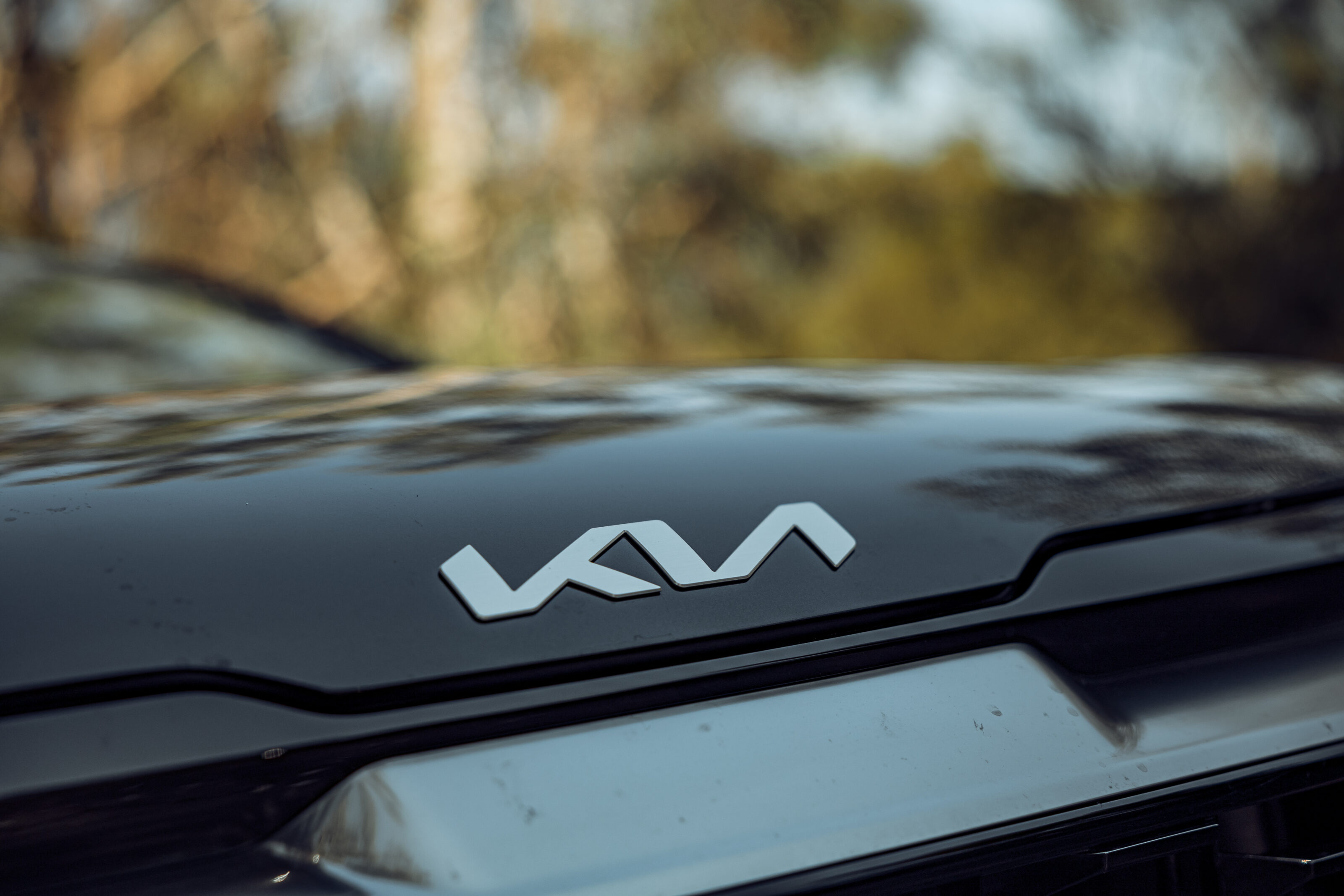
Kia Australia’s industry-leading seven-year warranty continues to be a massive bonus for owners, and roadside assistance is renewed annually with approved servicing.
Capped-priced servicing is also offered, with costs for the 2.0-litre diesel SX being:
- One year/15,000km $349
- Two years/30,000km $541
- Three years/45,000km $435
- Four years/60,000km $794
- Five years/75,000km $393
- Six years/90,000km $695
- Seven years/105,000km $417
VERDICT

With its jazzy good looks, any member of the Sportage family would earn some envious stares from your neighbours, and if that’s all that counts and you’re on a limited budget then the base-model S would do the trick. You can still get it with the 2.0-litre diesel too.
But, as our former Holden designer friend Richard Ferlazzo points out, we spend most of our time with our cars on the inside – so having the best and most enjoyable cabin experience is something we just can’t overlook, and for that reason, our SX wouldn’t be the pick of the bunch as it lacks a number of features and feels like too much of a downgrade compared to the higher specs available.
As an overall package, the Sportage is hard to ignore in any trim, but if budget allows, the range-topping GT-Line with the diesel engine ticks all the boxes with its stylish exterior, premium interior and impressive driving experience.
It’s where we’d invest our hard-earned.
2022 Kia Sportage SX Diesel specifications
Score breakdown
Things we like
- Looks and drives great
- Excellent use of digital screens
- Spacious and comfortable
- Efficient diesel engine
Not so much
- SX equipment and interior trim a letdown
- Fussy lane-keep assist
- No wireless smartphone mirroring
- No window tints
We recommend
-
 COTY
COTY2022 Wheels Car of the Year contender: Kia Sportage
A giant leap for Sportage, but only a small step for mid-size SUVs
-
 News
News2023 Kia Sportage pricing and features
The latest Australian pricing and details on Kia's popular Sportage medium SUV
-
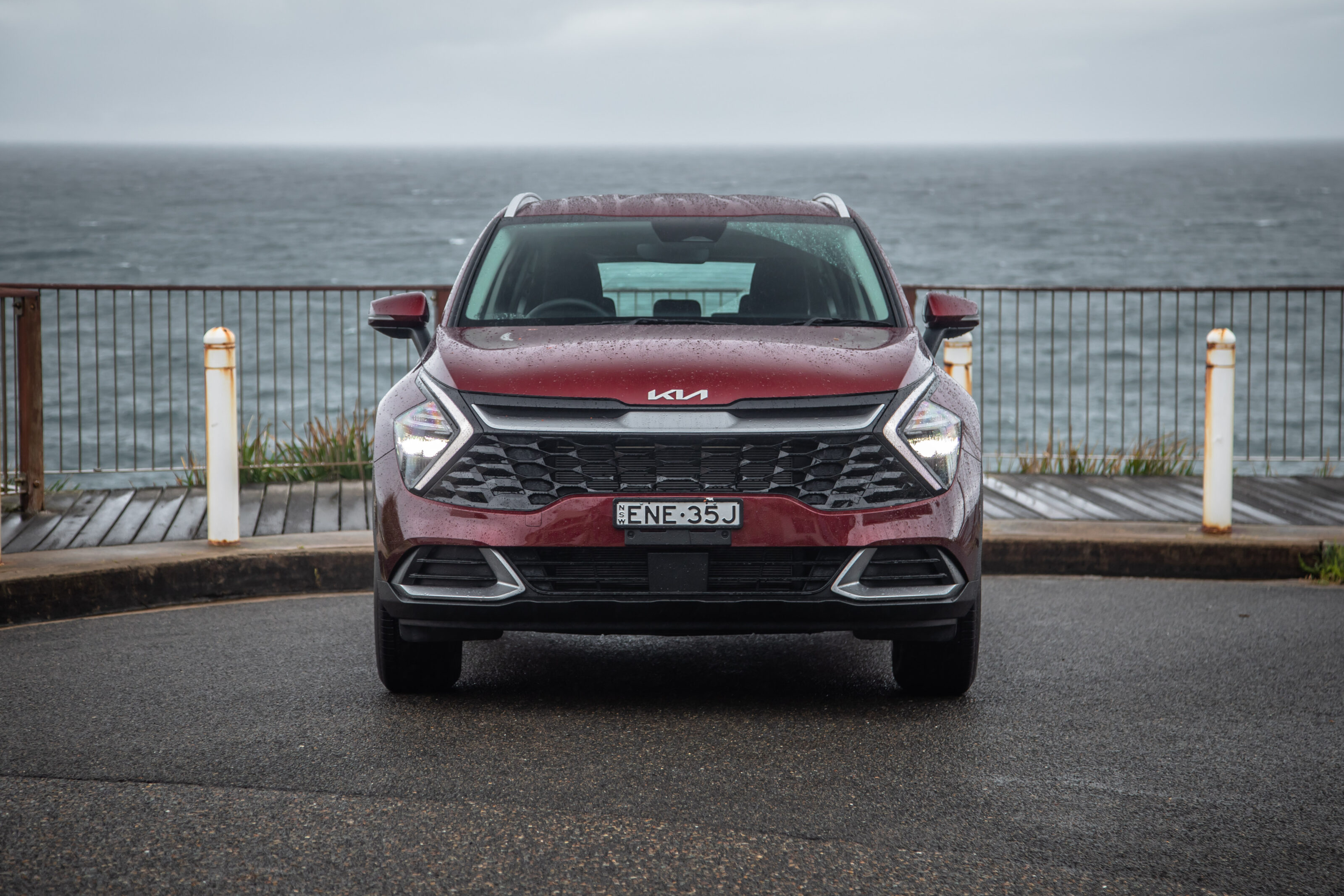 News
News2022 Kia Sportage: Everything we know about Kia's new medium SUV
Mid-size SUV scores bold styling, inside and out


